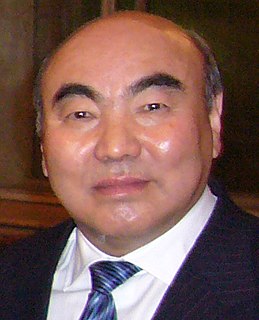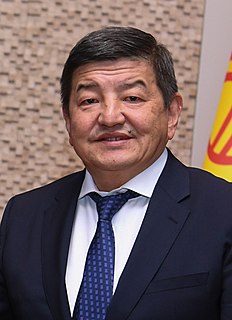
The history of the Kyrgyz people and the land now called Kyrgyzstan goes back more than 3,000 years. Although geographically isolated by its mountainous location, it had an important role as part of the historical Silk Road trade route. Turkic nomads, who trace their ancestry to many Turkic states such as the First and Second Turkic Khaganates, have inhabited the country throughout its history. In the 13th century, Kyrgyzstan was conquered by the Mongols; subsequently it regained independence but was invaded by Kalmyks, Manchus, and Uzbeks. In 1876, it became part of the Russian Empire, remaining in the USSR as the Kirghiz Soviet Socialist Republic after the Russian Revolution. Following Mikhael Gorbachev's democratic reforms in the USSR, in 1990 pro-independence candidate Askar Akayev was elected president of the SSR. On 31 August 1991, Kyrgyzstan declared independence from Moscow, and a democratic government was subsequently established.

The politics of Kyrgyzstan, officially known as the Kyrgyz Republic, takes place in the framework of a presidential system representative democratic republic, whereby the President is head of state and the Chairman of the Cabinet of Ministers is head of government. Executive power is exercised by the government. Legislative power is vested in both the government and parliament. The Economist Intelligence Unit rated Kyrgyzstan a "hybrid regime" in 2019.

Kyrgyzstan, or the Kyrgyz Republic, is a landlocked country in Central Asia. Kyrgyzstan is bordered by Kazakhstan to the north, Uzbekistan to the west, Tajikistan to the south, and the People's Republic of China to the east. Its capital and largest city is Bishkek.

Askar Akayevich Akayev is a Kyrgyz politician who served as President of Kyrgyzstan from 1990 until being overthrown in the March 2005 Tulip Revolution.

Parliamentary elections were held in Kyrgyzstan on 27 February and 13 March 2005. The belief that the elections had been rigged by the government led to widespread protests, culminating in the Tulip Revolution on 24 March in which President Askar Akayev was overthrown.
The Tulip Revolution or First Kyrgyz Revolution led to President of Kyrgyzstan Askar Akayev's fall from power. The revolution began after parliamentary elections on February 27 and March 13, 2005. The revolutionaries alleged corruption and authoritarianism by Akayev, his family and supporters. Akayev fled to Kazakhstan and then to Russia. On April 4, 2005, at the Kyrgyz embassy in Moscow, Akayev signed his resignation statement in the presence of a Kyrgyz parliamentary delegation. The resignation was ratified by the Kyrgyz interim parliament on April 11, 2005.

Roza Isakovna Otunbayeva is a Kyrgyz diplomat and politician who served as the President of Kyrgyzstan from 7 April 2010 until 1 December 2011, becoming the first female Central Asian head of state. She was sworn in on July 3, 2010, after acting as interim leader following the 2010 April Revolution, which led to the ousting of President Kurmanbek Bakiyev. She previously served as Minister of Foreign Affairs and as head of the parliamentary caucus for the Social Democratic Party of Kyrgyzstan.

Felix Sharshenbayevich Kulov is a Kyrgyz politician who served as the 9th Prime Minister of Kyrgyzstan from 2005 to 2007, following the Tulip Revolution. He first served from 1 September 2005 until he resigned on 19 December 2006. President Kurmanbek Bakiyev reappointed him acting Prime Minister the same day, but parliamentary opposition meant Bakiyev's attempts to renominate Kulov in January 2007 were unsuccessful, and on 29 January the assembly's members approved a replacement.

Kurmanbek Saliyevich Bakiyev is a Kyrgyz politician who served as the second President of Kyrgyzstan, from 2005 to 2010. Large opposition protests in April 2010 led to the takeover of government offices, forcing Bakiyev to flee the country.

Omurbek Chirkeshovich Tekebayev is a Kyrgyz politician. He was Speaker of the Kyrgyz Parliament from March 2005 to March 2006. Tekebaev is the leader of the Ata-Meken socialist party. Tekebayev is currently serving an eight-year jail sentence for corruption and fraud.
Bermet Askarevna Akayeva is a Kyrgyz politician and former MP. She is the daughter of ousted former President of Kyrgyzstan Askar Akayev. She graduated from the Frunze physics and mathematics school in 1989, studied at the Faculty of Computational Mathematics and Cybernetics, Moscow State University from 1989 to 1992 and at the Business School of Lausanne from 1992 to 1994. After receiving her MBA in 1994 she worked in the United Nations Compensation Commission in Geneva as a legal assistant. In 2000, she moved to Kyrgyzstan and became involved in business there.

Presidential elections were held in Kyrgyzstan on 10 July 2005. The result was a landslide victory for acting President Kurmanbek Bakiyev, marking the end of his interim government formed after the previous president, Askar Akayev, was overthrown in the revolution in March 2005.
Tursunbai Bakir Uulu is a Kyrgyz politician, former ombudsman and presidential candidate. He is leader of the political party Erkin Kyrgyzstan (ErK). A teacher by training, a historian, and a doctor of philosophy he is married with four children.

Zamira Sydykova served as Kyrgyz ambassador to the United States and Canada from 2005 to 2010, after a career as an opposition journalist, including imprisonment by the government of then-president Askar Akayev. After the Kyrgyz Revolution of 2010, Ambassador Sydykova served as a trade advisor, scholar at the Kennan Institute of the Woodrow Wilson International Center for Scholars, associate with Carnegie Endowment, as well as resumed her editorship of Res Publica. Ambassador Sydykova has received awards from the International Women's Media Foundation, Human Rights Watch, and Amnesty International.

Human rights in Kyrgyzstan improved after the ouster of President Askar Akayev in the 2005 Tulip Revolution and the installment of a more democratic government under Roza Otunbayeva. While the country is performing well compared to other states in Central Asia, many human rights violations still take place. Especially LGBT rights have been getting worse in recent years, freedom of press on the contrary has been improving.

The Supreme Council is the unicameral Parliament of the Kyrgyz Republic. It was known as the Supreme Soviet of the Kirghiz Soviet Socialist Republic until 1991.
Kerben is a town in Jalal-Abad Region of Kyrgyzstan. Its population was 18,695 in 2021. It is the administrative centre of Aksy District.
Dastan Islamovich Sarygulov is a Kyrgyz businessman and politician.
This article is a list of events in the year 2005 in Kyrgyzstan.

Japarov Üsönbek uulu Aqılbek is a Kyrgyz politician serving as Chairman of the Cabinet of Ministers of Kyrgyzstan since 12 October 2021. He replaced Ulukbek Maripov, who had been appointed to the new role by President Sadyr Japarov on 5 May 2021. Aqılbek is also concurrently the Head of the Presidential Administration under President Japarov.












